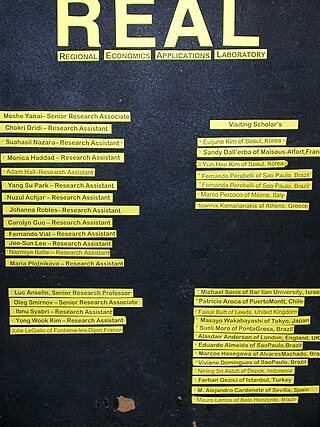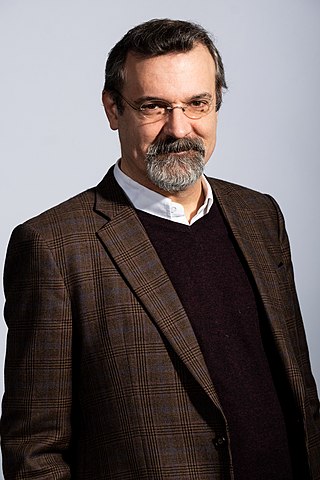Regional science is a field of the social sciences concerned with analytical approaches to problems that are specifically urban, rural, or regional. Topics in regional science include, but are not limited to location theory or spatial economics, location modeling, transportation, migration analysis, land use and urban development, interindustry analysis, environmental and ecological analysis, resource management, urban and regional policy analysis, geographical information systems, and spatial data analysis. In the broadest sense, any social science analysis that has a spatial dimension is embraced by regional scientists.
Sir Alan Geoffrey Wilson FAcSS is a British mathematician and social scientist, former Vice-Chancellor of the University of Leeds and a professor at University College London.

The Biocomplexity Institute of Virginia Tech is a research organization specializing in bioinformatics, computational biology, and systems biology. The institute has more than 250 personnel, including over 50 tenured and research faculty. Research at the institute involves collaboration in diverse disciplines such as mathematics, computer science, biology, plant pathology, biochemistry, systems biology, statistics, economics, synthetic biology and medicine. The institute develops -omic and bioinformatic tools and databases that can be applied to the study of human, animal and plant diseases as well as the discovery of new vaccine, drug and diagnostic targets.

Yerevan State University, also simply University of Yerevan, is the oldest continuously operating public university in Armenia. Founded in 1919, it is the largest university in the country. It is thus informally known as Armenia's "mother university". Of its 3,150 employees, 1,190 comprise the teaching staff, which includes 25 academicians, 130 professors, 700 docents, and 360 assistant lecturers. The university has 400 researchers, 1,350 post-graduate students, and 8,500 undergraduates, including 300 students from abroad.
The Earth Institute is a research institute at Columbia University created in 1995 for addressing complex issues facing the planet and its inhabitants, with a focus on sustainable development. With an interdisciplinary approach, this includes research in climate change, geology, global health, economics, management, agriculture, ecosystems, urbanization, energy, hazards, and water. The Earth Institute's activities are guided by the idea that science and technological tools that already exist could be applied to greatly improve conditions for the world's poor, while preserving the natural systems that support life on Earth.

The School of International and Public Affairs (SIPA) is the international affairs and public policy school of Columbia University, a private Ivy League university located in Morningside Heights, Manhattan, New York City. It is consistently ranked one of the leading graduate schools for international relations in the world. SIPA offers Master of International Affairs (MIA) and Master of Public Administration (MPA) degrees in a range of fields, as well as the Executive MPA and Ph.D. program in Sustainable Development.

Indira Gandhi Institute of Development Research (IGIDR) is an advanced research and educational institution in Mumbai, India. The institute's mission is to carry out research on developmental issues from a multi-disciplinary point of view. This includes economics, energy and environmental policy.

The Center for Economic Research and Graduate Education – Economics Institute, known as CERGE-EI is an academic institution in Prague, Czech Republic, specialised in economics. The institute is a partnership between the Center for Economic Research and Graduate Education of Charles University and the Economics Institute of the Czech Academy of Sciences. It is also a New York State Education Department entity with a permanent charter for its degree-granting educational programs awarded by the New York State Board of Regents. It is located in the Schebek Palace in the center of Prague.

The Regional Economics Applications Laboratory (REAL) at the University of Illinois at Urbana-Champaign is a regional science research center for advanced graduate students in the fields of economics, geography, urban and regional planning, computer science and mathematics. Professor Geoffrey J.D. Hewings, one of its founders, served as its director until 2016. Professor Sandy Dall'erba has been its director since 2016.
Stanford University has many centers and institutes dedicated to the study of various specific topics. These centers and institutes may be within a department, within a school but across departments, an independent laboratory, institute or center reporting directly to the dean of research and outside any school, or semi-independent of the university itself.
The College of Science at Virginia Tech contains academic programs in eight departments: biology, chemistry, economics, geosciences, mathematics, physics, psychology, and statistics, as well as programs in the School of Neuroscience, the Academy of Integrated Science, and founded in 2020, an Academy of Data Science. For the 2018-209 academic year, the College of Science consisted of 419 faculty members, and 4,305 students, and 600 graduate students The college was established in July 2003 after university restructuring split the College of Arts and Sciences, established in 1963, into two distinct colleges. Lay Nam Chang served as founding dean of the College of Science from 2003 until 2016. In 2016, Sally C. Morton was named dean of the College of Science. Morton served in that role until January 2021, when she departed for Arizona State University and Ronald D. Fricker—senior associate dean and professor in the Department of Statistics—was named interim dean of the College. In February 2022, Kevin T. Pitts was named the named the third official dean of the College of Science.

The Oeschger Centre for Climate and Climate Change Research (OCCR) is the interdisciplinary centre of excellence for climate research of the University of Bern.
The Centre for Advanced Spatial Analysis (CASA) is a research centre at University College London (UCL), which specialises in the application and visualisation of spatial analytic techniques and simulation models to cities and regions. It is a constituent department of The Bartlett Faculty of the Built-Environment.

The contributions of women in climate change have received increasing attention in the early 21st century. Feedback from women and the issues faced by women have been described as "imperative" by the United Nations and "critical" by the Population Reference Bureau. A report by the World Health Organization concluded that incorporating gender-based analysis would "provide more effective climate change mitigation and adaptation."

Antony Davies is an American economist, speaker, and author. He is an associate professor of economics at Duquesne University and the Milton Friedman Distinguished Fellow at the Foundation for Economic Education.

The Department of Geography in the College of Arts & Sciences at the University of Kentucky offers undergraduate degrees and graduate degrees and courses in physical and human geography. The department has an international reputation for the study of social theory and critical geography, including political ecology. Located in Lexington, Kentucky, the department is consistently ranked among leading geography graduate programs in the United States. The graduate students have organized the annual international conference, Dimensions of Political Ecology or DOPE, since 2010. In the summer of 2012, the department and faculty offices moved to the eighth floor of Patterson Office Tower.
Avinash Anant Deshpande is an Indian astrophysicist and a professor of physics at Raman Research Institute. Known for his research on astrophysics, Deshpande is known to have contributed towards the studies of the pulsar magnetospheric emission regions and in the elucidation of unphysically ultradense neutral hydrogen irregularities in the interstellar space.
Daniel Sui is a Chinese American geographer/GIScientist and currently serves as the senior president and chief research & innovation officer at Virginia Tech. Sui previously served as vice chancellor for research & innovation at the University of Arkansas – Fayetteville and division director for social & economic sciences at the U.S. National Science Foundation.
The Scientific Geography Series is a series of small books that each focus on a specific geographic concept from a scientific framework.









